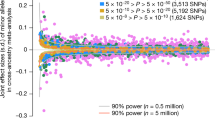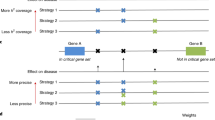Abstract
More than 5 million single-nucleotide polymorphisms (SNPs) with minor-allele frequency greater than 10% are expected to exist in the human genome1. Some of these SNPs may be associated with risk of developing common diseases2,3,4. To assess the power of currently available SNPs to detect such associations, we resequenced 50 genes in two ethnic samples and measured patterns of linkage disequilibrium between the subset of SNPs reported in dbSNP and the complete set of common SNPs. Our results suggest that using all 2.7 million SNPs currently in the database would detect nearly 80% of all common SNPs in European populations but only 50% of those common in the African American population and that efficient selection of a minimal subset of SNPs for use in association studies requires measurement of allele frequency and linkage disequilibrium relationships for all SNPs in dbSNP.
This is a preview of subscription content, access via your institution
Access options
Subscribe to this journal
Receive 12 print issues and online access
$259.00 per year
only $21.58 per issue
Buy this article
- Purchase on SpringerLink
- Instant access to the full article PDF.
USD 39.95
Prices may be subject to local taxes which are calculated during checkout


Similar content being viewed by others
References
Kruglyak, L. & Nickerson, D.A. Variation is the spice of life. Nat. Genet. 27, 234–236 (2001).
Risch, N. & Merikangas, K. The future of genetic studies of complex human diseases. Science 273, 1516–1517 (1996).
Collins, F.S., Guyer, M.S. & Chakravarti, A. Variations on a theme: cataloging human DNA sequence variation. Science 278, 1580–1581 (1997).
Lander, E.S. The new genomics: global views of biology. Science 274, 536–539 (1996).
Kruglyak, L. Prospects for whole-genome linkage disequilibrium mapping of common disease genes. Nat. Genet. 22, 139–144 (1999).
Gabriel, S.B. et al. The structure of haplotype blocks in the human genome. Science 296, 2225–2229 (2002).
Cargill, M. et al. Characterization of single-nucleotide polymorphisms in coding regions of human genes. Nat. Genet. 22, 231–238 (1999).
Cambien, F. et al. Sequence diversity in 36 candidate genes for cardiovascular disorders. Am. J. Hum. Genet. 65, 183–191 (1999).
Halushka, M.K. et al. Patterns of single-nucleotide polymorphisms in candidate genes for blood-pressure homeostasis. Nat. Genet. 22, 239–247 (1999).
Sachidanandam, R. et al. A map of human genome sequence variation containing 1.42 million single-nucleotide polymorphisms Nature 409, 928–933 (2001).
Reich, D.E., Gabriel, S.B. & Altshuler, D. Quality and completeness of SNP databases. Nat. Genet. 33; advance online publication 24 March 2003; doi:10.1038/ng1133.
Pritchard, J.K. & Przeworski, M. Linkage disequilibrium in humans: models and data. Am. J. Hum. Genet. 69, 1–14 (2001).
Johnson, G.C. et al. Haplotype tagging for the identification of common disease genes. Nat. Genet. 29, 233–237 (2001).
Marth, G. et al. Single-nucleotide polymorphisms in the public domain: how useful are they? Nat. Genet. 27, 371–372 (2001).
Livak, K.J. Allelic discrimination using fluorogenic probes and the 5′ nuclease assay. Genet. Anal. 14, 143–149 (1999).
Marth, G.T. et al. A general approach to single-nucleotide polymorphism discovery. Nat. Genet. 23, 452–456 (1999).
Ning, Z., Cox, A.J. & Mullikin, J.C. SSAHA: a fast search method for large DNA databases. Genome Res. 11, 1725–1729 (2001).
Altshuler, D. et al. An SNP map of the human genome generated by reduced representation shotgun sequencing. Nature 407, 513–516 (2000).
Irizarry, K. et al. Genome-wide analysis of single-nucleotide polymorphisms in human expressed sequences. Nat. Genet. 26, 233–236 (2000).
Buetow, K.H., Edmonson, M.N. & Cassidy, A.B. Reliable identification of large numbers of candidate SNPs from public EST data. Nat. Genet. 21, 323–325 (1999).
Collins, F.S., Brooks, L.D. & Chakravarti, A. A DNA polymorphism discovery resource for research on human genetic variation. Genome Res. 8, 1229–1231 (1998).
Hill, W.G. Estimation of linkage disequilibrium in randomly mating populations. Heredity 33, 229–239 (1974).
Devlin, B., Risch, N. & Roeder, K. Disequilibrium mapping: composite likelihood for pairwise disequilibrium. Genomics 36, 1–16 (1996).
Hudson, R.R. Generating samples under a Wright–Fisher neutral model of genetic variation. Bioinformatics 18, 337–338 (2002).
Acknowledgements
The authors would like to thank Q. Yi, T. Armel, E. Calhoun, D. Carrington, M. Chung, P. Keyes, P. Lee, C. Poel and E. Toth for producing sequence variation data for the SeattleSNPs Program for Genomic Applications and M. Lundberg and S. Banks-Schlegel for their advice and encouragement. This work was supported by a Program for Genomic Applications grant from the National Heart Lung and Blood Institute (to D.A.N., M.J.R. and L.K.) with additional support from the National Institute of Mental Health (to L.K.). L.K. is a James S. McDonnell Centennial Fellow.
Author information
Authors and Affiliations
Corresponding authors
Ethics declarations
Competing interests
D.A.N and L.K. consult for or own equity in companies that are interested in SNPs and association studies.
Rights and permissions
About this article
Cite this article
Carlson, C., Eberle, M., Rieder, M. et al. Additional SNPs and linkage-disequilibrium analyses are necessary for whole-genome association studies in humans. Nat Genet 33, 518–521 (2003). https://doi.org/10.1038/ng1128
Received:
Accepted:
Published:
Issue date:
DOI: https://doi.org/10.1038/ng1128
This article is cited by
-
Haplotypes of P2RX7 Gene Polymorphisms are Associated with both Cold Pain Sensitivity and Analgesic Effect of Fentanyl
Molecular Pain (2014)
-
Pharmacogenomics and Individualized Medicine: Translating Science Into Practice
Clinical Pharmacology & Therapeutics (2012)
-
An abundance of population-specific monomorphic SNPs may or may not be meaningful: a commentary on differences in allele frequencies of familial hypercholesterolemia SNPs in the Malaysian population
Journal of Human Genetics (2012)
-
Porcine Single Nucleotide Polymorphism (SNP) Development and Population Structure of Pigs Assessed by Validated SNPs
Biochemical Genetics (2012)
-
Inferring linkage disequilibrium from non-random samples†
BMC Genomics (2010)



